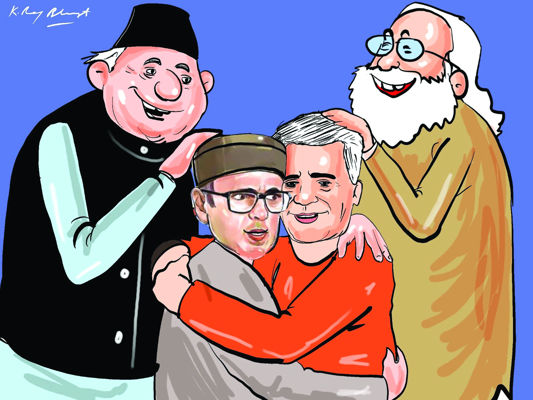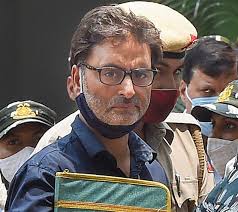The Shadow Government Controversy: Democracy’s Watchdog or Political Theater?
By: Javid Amin
Srinagar 03 Narch 2025 : The political landscape of Jammu and Kashmir (J&K) has erupted into a fiery debate over the Bharatiya Janata Party’s (BJP) proposal to establish a “shadow government”—a move Chief Minister Omar Abdullah dismisses as theatrics. Senior BJP leader Dr. Abhijeet Jasrotia, however, frames this as a democratic necessity. “A shadow government isn’t about usurping power; it’s about ensuring the ruling party doesn’t drown out the people’s voice,” he asserts.
The concept, borrowed from parliamentary systems like the UK’s, designates opposition leaders to mirror ministerial roles, scrutinizing policies and offering alternatives. In J&K, where the BJP secured 1.5 lakh more votes than the National Conference (NC) in the 2024 Assembly elections but opted to sit in opposition, Dr. Jasrotia argues this structure is vital. “When the ruling party lacks an absolute majority, accountability becomes optional. We’re here to make it mandatory,” he states.
Dr. Abhijeet Jasrotia’s Defense: Why Jammu Demands Vigilance
Dr. Jasrotia, the BJP’s chief spokesperson, roots his argument in history. Since 1951–52, Jammu—a BJP stronghold—has faced systemic marginalization in favor of Kashmir-centric governance. Gerrymandering, he claims, has skewed constituencies to dilute Jammu’s influence. For instance, the Jammu region, with 45% of J&K’s population, holds only 37 assembly seats, compared to Kashmir’s 47. “This isn’t democracy; it’s demographic manipulation,” he says.
His critique extends to Omar Abdullah’s administration. The NC’s 2024 manifesto promised 1 lakh government jobs, 200 free electricity units monthly, and 12 free LPG cylinders annually. Yet, six months post-election, these remain unfulfilled. “Only 8% of households received cylinders, and those were EWS families already under central schemes. The NC repackaged old wine in new bottles,” Dr. Jasrotia alleges.
Omar Abdullah’s Rebuttal: “No Room for Shadow Cabinets in India”
Chief Minister Omar Abdullah, meanwhile, brushes off the shadow government idea as unconstitutional. “India follows the Westminster model but doesn’t mandate shadow cabinets. My government is accountable to the Assembly and the people—not the BJP’s parallel fantasy,” he retorts.
During a press conference on Ramazan preparations, Omar shifted focus to governance: “We’ve ensured uninterrupted electricity during Sehri and Iftar, upgraded water supply infrastructure, and streamlined ration distribution.” Critics, however, note these are routine annual measures, not groundbreaking reforms.
Decades of Neglect: How Gerrymandering Shaped Jammu’s Political Destiny
Jammu’s grievances date to 1951, when Sheikh Abdullah’s government redrew constituencies to favor Kashmir. Post-2019, when Article 370 was revoked, the BJP hoped to reset this imbalance. Yet, Dr. Jasrotia argues, the NC’s “Kashmir-first” approach persists. For example, 70% of J&K’s infrastructure projects in 2023–24 were allocated to Kashmir, despite Jammu contributing 60% of the state’s revenue.
“When a Srinagar road is repaired within 24 hours, but Jammu’s Akhnoor highway remains potholed for months, it’s not governance—it’s favoritism,” says Sunil Sharma, BJP’s Leader of Opposition.
GDP Doubled, J&K Bank Revived: BJP’s Legacy vs. NC’s Current Struggles
The BJP’s tenure (2019–2024) saw J&K’s GDP surge from ₹1.3 lakh crore to ₹2.8 lakh crore, driven by tourism and horticulture. The J&K Bank, once drowning in ₹12,000 crore bad loans, returned to profitability in 2023. “We revived 2,500 stalled projects, including the Udhampur-Srinagar-Baramulla rail link,” Dr. Jasrotia notes.
Contrastingly, the NC’s current struggles include bureaucratic paralysis. Over 50 IAS officers have sought transfers since 2024, citing “micromanagement and harassment.” A senior official, requesting anonymity, says, “Every file needs the CM’s approval. It’s suffocating.”
Ramazan Preparations & Legislative Storms: Inside Omar’s Balancing Act
Omar’s recent condolence visit to separatist leader Mirwaiz Umer Farooq’s family sparked controversy. “Why is the CM legitimizing separatists?” asked BJP’s Kavinder Gupta. Meanwhile, the upcoming budget session promises fireworks. PDP MLA Waheed-ur-Rehman Para’s bill to amend the J&K Reorganisation Act—aimed at restoring “permanent resident” rights—faces fierce BJP opposition. “The Act is settled law. This is a divisive ploy,” Dr. Jasrotia warns.
The Road Ahead: Scrutiny, Reforms, or Political Warfare?
As the BJP vows to “expose the NC’s failures daily,” Omar remains defiant: “Let them rant; we’ll deliver.” Yet, with J&K’s voter turnout hitting a record 68% in 2024, public patience is thinning. Dr. Jasrotia invokes Lincoln: “You can’t fool all the people all the time.” Whether the shadow government idea gains traction or fades, one truth is clear—J&K’s political theater is just getting started.



